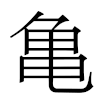亀
See also: 龜
| ||||||||
| ||||||||
Translingual
| Stroke order | |||
|---|---|---|---|
 | |||
| Traditional | 龜 |
|---|---|
| Shinjitai | 亀 |
| Simplified | 龟 |
Glyph origin
Variant of 龜, simplified from 龜[[Category:|亀]]. The modern Japanese usage is of reform (shinjitai) nature.
Han character
亀 (Kangxi radical 213, 亀+0, 11 strokes, cangjie input 弓田中山 (NWLU), four-corner 27716, composition ⿻龟日)
References
- KangXi: not present, would follow page 142, character 28
- Dai Kanwa Jiten: character 210
- Hanyu Da Zidian (first edition): volume 8 (in addendum), page 10, character 19
- Unihan data for U+4E80
Chinese
| For pronunciation and definitions of 亀 – see 龜 (“turtle; tortoise; cuckold; etc.”). (This character, 亀, is a variant form of 龜.) |
Japanese
| 亀 | |
| 龜 |
Readings
Compounds
- 神亀 (Jinki)
- 金亀子 (koganemushi)
Etymology 1
| Kanji in this term |
|---|
| 亀 |
| かめ Grade: S |
| kun’yomi |
| Alternative spelling |
|---|
| 龜 (kyūjitai) |

⟨kame2⟩ → */kaməɨ/ → /kame/
From Old Japanese.
(This etymology is missing or incomplete. Please add to it, or discuss it at the Etymology scriptorium. Particularly: “What is etymological meaning?”)
Noun
亀 • (kame)
- a tortoise or turtle (land or marine reptile with a shell)
- 2007, Kōsuke Hasumi, The Biology of Fairy Tales (page 28)
- 休んで負けてしまったウサギと休まず走って勝利したカメ。
- Yasunde makete shimatta usagi to yasumazu hashitte shōri shita kame.
- The tortoise that ran without resting and won, and the hare that rested and lost.
- 休んで負けてしまったウサギと休まず走って勝利したカメ。
- 2007, Kōsuke Hasumi, The Biology of Fairy Tales (page 28)
- (by extension, figurative, as turtles are thought to be good drinkers) a drunkard
- a 家紋 (kamon, “family crest”) with various designs of tortoises
- (figurative) sluggishness; also, such a person
- a shrugger
- (slang, as it resembles a turtle's neck) a penis
Usage notes
As with many terms that name organisms, this term is often spelled in katakana, especially in biological contexts (where katakana is customary), as カメ.
Derived terms
Idioms
- 亀の年を鶴が羨む (kame no toshi o tsuru ga urayamu)
Proverbs
- 鶴は千年亀は万年 (tsuru wa sennen kame wa mannen)
Etymology 2
| Kanji in this term |
|---|
| 亀 |
| き Grade: S |
| on’yomi |
| Alternative spelling |
|---|
| 龜 (kyūjitai) |
From Middle Chinese 龜 (MC kˠiuɪ).
Derived terms
See also
- タートル (tātoru)
- トータス (tōtasu)
- 鼈 (suppon)
Korean
This article is issued from Wiktionary. The text is licensed under Creative Commons - Attribution - Sharealike. Additional terms may apply for the media files.